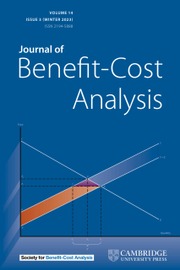Article contents
A Test of Hirschman’s Hiding Hand Principle in World Bank-Financed Hydropower Projects
Published online by Cambridge University Press: 22 May 2023
Abstract
This study is an attempt to determine whether the need to get hydropower project appraisals perfectly right during the pre-construction phase, so as to prevent significant overruns along with benefit shortfalls, should supersede the need to deliver projects at the earliest possible time so as to meet the needs of the people. To achieve the study objective, we test whether the Hiding Hand principle is predominantly benevolent or malevolent. We argue that if the Hiding Hand is benevolent, then project stakeholders are better off focusing on the quick delivery of power projects; however, if it is malevolent, then more attention should be given to perfecting project appraisals. It transpires from the statistical analysis that the Benevolent Hiding Hand dominates the Malevolent Hiding Hand in the selected World Bank-financed hydropower projects (33% v. 21%), and that ultimately, 75% of the projects were even more successful than anticipated—while 25% of the projects failed. Our findings further show that while a total loss of 2.335 billion USD in the sampled dams was caused by the Malevolent Hiding Hand, 11.259 billion USD was gained as a result of the Benevolent Hiding Hand. The predominance of the Benevolent Hiding Hand justifies placing some weight on proceeding with hydropower projects that show significant promise even if all the implantation risks are not fully quantified at the appraisal stage, especially in developing countries.
Information
- Type
- Article
- Information
- Copyright
- © The Author(s), 2023. Published by Cambridge University Press on behalf of the Society for Benefit-Cost Analysis
References
- 2
- Cited by

